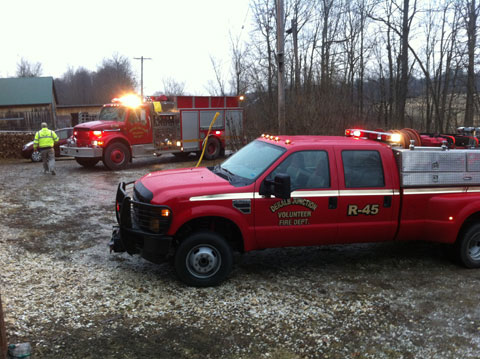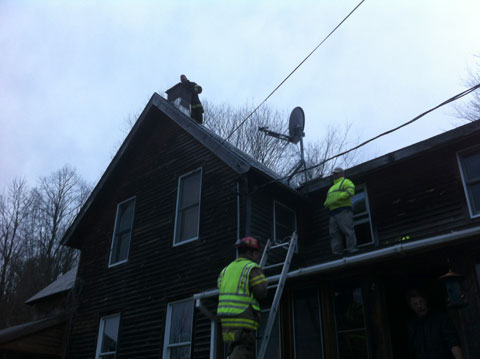Fire!
 I’ve lived in a wood-heated home for over 40 years and, unfortunately, I’m no stranger to fires. Back in the ’70s, we had two fires in an old chimney that vented our pre-WWII Home Comfort cookstove. After the second episode, which drew every resident in Old DeKalb–all apparently members of the volunteer fire department–we tore down the chimney and built a new one. In retrospect, we were incredibly ignorant about proper maintenance of chimneys and, more to the point, incredibly lucky.
I’ve lived in a wood-heated home for over 40 years and, unfortunately, I’m no stranger to fires. Back in the ’70s, we had two fires in an old chimney that vented our pre-WWII Home Comfort cookstove. After the second episode, which drew every resident in Old DeKalb–all apparently members of the volunteer fire department–we tore down the chimney and built a new one. In retrospect, we were incredibly ignorant about proper maintenance of chimneys and, more to the point, incredibly lucky.
We weren’t so lucky in 1998, a month after the ice storm. A hard plastic watering tank positioned just outside the back door of the barn caught fire. The water had dropped below the level of the heating element used to keep the tank ice-free. This ignited the tank which in turn ignited the barn wall. It was the middle of the day–we were all at work or school. (In fact, it was a Tuesday afternoon and I was on the air when a colleague came to alert me and send me home.) The more than 100-year old barn was destroyed and, sadly, we lost five of our horses. Again, though, in a sense we were lucky: thanks to the quick wits of a neighbor who spotted the fire and rushed to our house before the fire department arrived, our home was spared because she had the presence of mind to hook up a hose to drench the end of our house closest to the barn.
 Last week, in spite of all our best practices, we had a fire in the chimney that vents our cookstove. It was sleeting, the roof slick with ice and we decided to bring in the fire department rather than attempt an ascent without the fire truck ladders. We were pretty sure the fire was going to go out on its own, but I’ve learned, well, to not play with fire.
Last week, in spite of all our best practices, we had a fire in the chimney that vents our cookstove. It was sleeting, the roof slick with ice and we decided to bring in the fire department rather than attempt an ascent without the fire truck ladders. We were pretty sure the fire was going to go out on its own, but I’ve learned, well, to not play with fire.
The roads were so bad that the ladder truck ended up in the ditch on the way over from Richville. Nonetheless, members of both the Richville and DeKalb Junction departments arrived within 15 minutes and managed to climb the roof without the big ladders. They stayed for two hours, thoroughly cleaning and checking the chimney. I was grateful for their thoroughness and competence.
Consider this a cautionary tale: it’s that time of year. Fires happen. Many of us have been keeping slow-burning fires because of the relatively mild weather. As you probably know, slow fires tend to create more creosote build up in chimneys.
If you’re looking for a way to participate in and contribute to the life of your community, think about joining your local volunteer fire department–there’s always a shortage of able volunteers.
A huge shout out of thanks to the Richville and DeKalb Junction teams!

Finally, at dusk, the chimney is given the all clear. (However, we waited for the code officer to give it the okay before using it again a few days later.)
Tags: DeKalb Junction, fire, richville, volunteer fire departments





.jpg)


It sounds as if you might not be following best practices for cleaning and maintaining your chimneys. If you’re a frequent flier with your local fire departments you are endangering the lives of volunteers with your carelessness.
And another place for year-end donations if there is some in the pot to hand out.